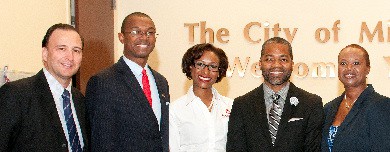Summit of the Americas Highlights U.S. Commitment to Hemisphere
Offers region’s leaders a “bully pulpit,” coordinator Hector Morales says
By Eric Green
MIAMI — The April 2009 Summit of the Americas will offer President-elect Barack Obama a “unique opportunity very early” in his administration to signal ongoing American commitment to the Western Hemisphere, says the U.S. national summit coordinator, Hector Morales.
Interviewed at the December 1-3 Miami Conference on the Caribbean and Central America, Morales said the fifth summit, to be held in Trinidad and Tobago, will give Obama a chance to meet with the leaders of the 33 other democracies in the Western Hemisphere.
The summit also will reinforce the advances with the Americas made by President Bush in expanding trade opportunities, enhancing security, extending U.S. foreign assistance and offering debt relief to poorer nations, as well as such health initiatives as the Bush emergency program to fight HIV/AIDS.
It is important that the United States sends a “signal that the hemisphere is important to us,” Morales said, because “when our neighbors are succeeding” the United States also benefits.
He said the summit process, started by former President Bill Clinton with the first Summit of the Americas in 1994, has enjoyed “terrific bipartisan” political support in the United States. Bush attended two regular summits and a 2004 “special summit,” during his presidency.
KEY HEMISPHERIC CHALLENGES
One big challenge facing the region’s heads of state, said Morales, is ensuring that democratic governments are “delivering or engendering opportunities for their people.”
“The level of poverty and inequality in the hemisphere is very high,” said Morales, “so we want to make sure that governments and the way they are governed are responsive in creating economic and social opportunities for their people.”
Morales, who is also the U.S. permanent representative to the Organization of American States, said another challenge facing the region is public security, which is tied into the summit theme of “Securing Our Citizens’ Future by Promoting Human Prosperity, Energy Security and Environmental Sustainability.”
“Democracy and development will not be sustainable or long-lasting if there’s not going to be a secure environment,” said Morales. He said security is connected to fighting the transnational problems of trafficking in drugs and small arms, as well as human trafficking.
“If people don’t feel they have economic opportunities, they turn to crime, so these security issues” are of “extreme concern,” Morales said.
In his remarks at a forum about the summit at the Miami conference, Morales said that energy security will be a focus of the Trinidad and Tobago event and “what many of us would like to see is further and deepening collaboration on energy development in a sustainable and responsible way.” Renewable energy and biofuel development are important components in providing sustainable energy, he said.
A U.S. partnership with Brazil on developing biofuels represents a diverse “energy matrix” that should be applied worldwide, said Morales. He cited a November 20 announcement that the United States and Brazil will further work together to expand energy technology to other Western Hemisphere nations and in Africa. (See “Joint Statement by United States and Brazil on Energy Security.”)
Morales said the summit represents an opportunity to continue building partnerships between the United States and its neighbors in the Latin American region. To address common transnational issues, he said, it is important that nations work collectively to ensure the “mandates that are generated from the summit … are actually implemented,” which is where the resources of the private sector and nongovernmental groups become crucial.
Beyond promoting trade and renewable energy, Morales said the United States also wants to improve responses to climate change and natural disasters to ensure that “basic services are available to all,” which includes providing safe drinking water and sanitation.
The global economic crisis will also be an important topic at the 2009 summit, Morales said. The Summit, he said, offers an excellent “bully pulpit” (platform) for the Western Hemisphere’s 34 heads of state to address that critical issue.


